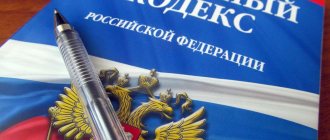Article 190 of the Penal Code of the Russian Federation. Responsibility of probationers (current version)
1. If a conditionally convicted person evades the fulfillment of the duties assigned to him by the court, evades compensation for damage (in whole or in part) caused by the crime, in the amount determined by a court decision, by concealing property, income, evading work or in another way, or if he violates public order, for which he was brought to administrative responsibility, the criminal-executive inspection or the command of a military unit warns him in writing about the possibility of revoking his suspended sentence. Evasion of compensation for damage caused by a crime also includes failure to compensate for such damage for unjustified reasons.
2. If a conditionally convicted person fails to comply with the requirements specified in part four of Article 188 of this Code, as well as in the presence of other circumstances indicating the advisability of assigning other duties to the conditionally convicted person, the head of the penal inspection or the command of a military unit makes a corresponding submission to the court. Information about the debt of a conditionally convicted person under executive documents on compensation for harm caused by a crime may be submitted to the victim by the victim to the penal inspection or the command of a military unit.
3. If there are sufficient grounds, the criminal-executive inspection or the command of the military unit sends a proposal to the court to extend the probationary period.
Advertisement probation and execution of punishment imposed by a court verdict.
5. A systematic violation of public order is the commission by a probationer of two or more violations of public order within one year, for which he was brought to administrative responsibility. Systematic failure to fulfill duties is the commission of prohibited or failure to perform actions prescribed to a conditionally convicted person more than twice within one year, or prolonged (more than 30 days) failure to fulfill the duties assigned to him by the court.
6. A conditionally convicted person whose location has not been established for more than 30 days is recognized as absconding from control.
President of the Russian Federation B. YELTSIN
Moscow Kremlin
January 8, 1997
N 1-FZ
Censorship in correctional institutions
According to the new version of Article 15 of the Penal Code of the Russian Federation “Appeals of convicts and the procedure for their consideration”, proposals, statements, petitions and complaints of those sentenced to arrest, detention in a disciplinary military unit, imprisonment, death penalty, addressed to:
- the President of the Russian Federation;
- to the chambers of the Federal Assembly of the Russian Federation;
- to the government of the Russian Federation;
- to the legislative (representative) bodies of the constituent entities of the Russian Federation;
- to the executive authorities of the constituent entities of the Russian Federation;
- to the court, prosecutorial authorities, higher authorities of the penal system and their officials;
- Commissioner for Human Rights in the Russian Federation;
- Commissioner under the President of the Russian Federation for Children's Rights;
- Commissioner under the President of the Russian Federation for the protection of the rights of entrepreneurs;
- Commissioner for Human Rights in a constituent entity of the Russian Federation;
- Commissioner for Children's Rights in a constituent entity of the Russian Federation;
- Commissioner for the Protection of the Rights of Entrepreneurs in a Subject of the Russian Federation;
- to public supervisory commissions formed in accordance with the legislation of the Russian Federation;
- in accordance with international treaties of the Russian Federation, to interstate bodies for the protection of human rights and freedoms (new);
- to the European Court of Human Rights (new).
Responses to such requests are not subject to censorship. The specified proposals, statements, petitions and complaints no later than one business day are transferred to telecom operators for their delivery according to their ownership.
Everything about criminal cases
Go to the text of the PEC
Url Additional information:
Deferment of punishment
- Part 1 177 PEC
the petition can be filed by the convicted person or by a lawyer
Request by the administration for documents
- part 2 177 PEC
request for documents - within 10 days after filing the application:
- part 2 177 PEC
required - consent of relatives to accept the convicted person
- part 2 177 PEC
required - a certificate confirming that the convicted person has housing
- part 2 177 PEC
required - documentary evidence of the presence of a child
Sending documents to court
- Part 3 177 PEC
documents are sent to the court - within 10 days from receipt:
- Part 3 177 PEC
sent to court - characteristics and personal file of the convicted person
- Part 3 177 PEC
sent to court - notification of the victim about the petition
Execution of the decision on release
- part 4 177 PEC
release immediately after receiving a court decision
- part 5 177 PEC
going to your place of residence - independently
- part 6 177 PEC
a copy of the court ruling on deferment is sent to the inspection
- Part 7 177 PEC
the inspectorate registers the convicted person
- Part 8 177 PEC
If you fail to appear within 2 weeks, a search will be carried out.
Selection of materials
Deferment for parents
until the child reaches 14 years of age (
Criminal Code 82
)
Article 177 of the Penal Code. Deferment of serving a sentence for convicted persons
1) A convicted person who is serving a sentence in a correctional institution and who may be granted a deferment of serving the sentence in accordance with Part 1 82 of the Criminal Code, his lawyer, legal representative have the right to apply to the court with a petition for a deferment of serving the sentence, and the administration of the correctional institution - with the appropriate presentation.
The convicted person submits a request for a deferment of serving his sentence through the administration of the correctional institution.
2) The administration of the correctional institution, within 10 days after the convict submits a petition for deferment of serving the sentence, requests from the relevant state authorities, local government bodies and relatives of the convict:
Url Additional information:
Consent of relatives
Consent of relatives
accept accommodation (
clause 25
of Plenum No.
- a certificate of consent of relatives to accept the convicted person and the child, provide them with housing and create the necessary conditions for living;
Url Additional information:
Housing and conditions for education
Housing and conditions
for raising a child (
clause 25
of Plenum No.
- or a certificate confirming that the convicted person has housing and the necessary conditions for living with a child;
Url Additional information:
Supporting documents
Certificate of pregnancy
or the presence of a child under 14 years of age (
clause 25
of Plenum No.
- medical report on the pregnancy of the convicted woman;
- or a certificate confirming that the convicted person has a child.
3) The administration of the correctional institution, no later than 10 days after the day of receipt of the documents specified in Part 2 of this article, sends to the court:
- petition (submission) for deferment of serving the sentence;
— specified documents;
Url Additional information:
Administration's opinion on the postponement
Administration's opinion
— is it worth granting a deferment (
clause 25
of Plenum No.
— characteristics;
Url Additional information:
Information from your personal file
Private bussiness
: information from it from the administration (
clause 25
of Plenum No.
- a personal matter of the convicted person.
Url Additional information:
— Part 5.1 42 Code of Criminal Procedure
filing a victim's request to obtain information
— Part 5 313 Code of Criminal Procedure
duties of the court at the request of the victim
Informing the victim
Victim's petition
on informing about a convicted person (
Part 5 313 of the Code of Criminal Procedure
)
The victim's opinion about the delay
Victim's opinion
on the possibility of granting a deferment (
Part 3 177 of the Criminal Code
)
If there is a copy of the court ruling or order in the personal file of the convicted person to notify the victim or his legal representative, the administration of the correctional institution provides information about the place of residence of the victim or his legal representative and other information about the victim or his legal representative, ensuring their timely notification, if any.
4) The administration of a correctional institution, having received a court ruling to defer the serving of a sentence in relation to a convicted person, releases him. The administration of the correctional institution takes a signature from the convicted person to appear at the penal inspection at his place of residence within 3 days from the date of arrival.
5) The convicted person goes to his place of residence independently at the expense of the federal budget.
6) On the day of release, a copy of the court ruling on deferment of serving the sentence, indicating the date of release, is sent to the penal inspection at the place of residence of the convicted person.
7) The criminal-executive inspection registers the convicted person and subsequently monitors his behavior.
 After the appearance of the convicted person, the penal inspection is obliged to send confirmation within 3 days to the correctional institution at the place of release of the convicted person.
After the appearance of the convicted person, the penal inspection is obliged to send confirmation within 3 days to the correctional institution at the place of release of the convicted person.
9) If the convicted person fails to arrive within 2 weeks from the date of his release, the penal inspection carries out initial search activities, and if results are not achieved, sends materials to put the convicted person on the wanted list.
Return to the text of the PEC
Seek advice
In St. Petersburg, six out of 12 members of PEC-177 turned out to be fake people
In St. Petersburg, at polling station No. 177, six members of the commission were replaced with dummy people during the elections to the State Duma. They were promised to pay 20 thousand rubles for participating in the production, Fontanka reports, citing one of the participants in the chat of members of the election commission.
The source provided a screenshot of a message made on September 17 in the St. Petersburg election commission’s WhatsApp chat. “You are members of precinct commission No. 177. Please remember your new names for these three days,” the message says.
The message lists the names of six voting members of the commission: Elizaveta Metelkina, Vladislav Karpov, Ksenia Lonshchakova, Alena Mikhailova, Yulia Savko and Dmitry Pashkov. In total, PEC No. 177 included 12 members.
Several commission members wore homemade badges, even though they should have identification with a photo and stamp. Olga Dmitrieva, coordinator of the St. Petersburg Observers, said that several members of the PEC refused to show their passports and identification cards for verification.
The chat of members of the election commission was created by the chairman of commission No. 177, member of the LDPR Maria Mulyuk. At the same time, secretary Anastasia Selivanova was responsible for coordinating the actions. It was from her phone that the message about the name substitution was sent.
The website of the St. Petersburg election commission says that she was nominated for the position of secretary by the local branch of the Green party. The spoiler of the most famous St. Petersburg oppositionist, Boris Vishnevsky, ran for the State Duma from the Greens in the same district. The fake Boris Vishnevsky was Viktor Bykov before the elections and even headed one of the local election commissions.
Elizaveta Metelkina is Selivanova’s 22-year-old sister. Fontanka published a video filmed by an election observer in which an adult woman with short hair calls herself Elizaveta Pavlovna Metelkina. According to the publication, instead of Metelkina, 52-year-old native of Smolensk Olga Gritseva worked in the elections, instead of Karpov - 29-year-old actor Philip Strizhanov, instead of Lonshchakova - student of the restoration college Evgenia Serebrova, and instead of Savko - Irina Mazenkova, who works as a depilation master. Pashkov was replaced in the elections by Dmitry Gusev.
The fake members of the PEC did not answer questions from journalists or hung up.
The costumed members of the election commission were assigned to vote at home. As a result, the number of “homeworkers” exceeded 25% of all voters. These are anomalous figures, since the average home-based voting for these elections does not exceed 6%.
As follows from the complaint of a member of the PEC with an advisory vote, Irina Lotova, employees of the 177th commission visited voters every 3 minutes, although they were in different houses and even on different streets. Lotova could not control the actions of her colleagues: PEC Chairman Maria Mulyuk forbade her to join the group providing home-based voting.
Yabloko commission member Alexander Lyakh noted that home voting boxes contained 68-80 completed ballots, which is “strangely more” than usual (5-15 pieces), the BBC Russian Service reports. Lyakh was the only voting member of the PEC who did not agree with the final protocol.
According to the election results, the United Russia candidate Konstantin Chebykin won at this polling station.
If it is confirmed that mummers worked for members of the election commission, this can be qualified under Article 141 of the Criminal Code of the Russian Federation (obstruction of the exercise of electoral rights or the work of election commissions), says Dmitry Krasnyansky, a member of the city election commission. The punishment under this article reaches five years in prison.
The main rival of United Russia member Konstantin Chebykin, who won in this section, in the elections to the Legislative Assembly, candidate from A Just Russia, Nelly Vavilina, calls PEC-177 a “team of falsifiers” and is going to court.
During the elections to the Legislative Assembly of St. Petersburg and the State Duma of the Russian Federation, independent observers not only recorded numerous violations, but also faced attempts to interfere with their work. On the night of the vote count, members of the commissions insulted them, did not allow them to work, planted campaign materials and took them away from polling stations with the help of the police, observers told The Insider.





